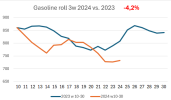24.06.2024, 01:44
17K2 min.
6
Gasoline let us down
Fuel production behind plan
Given the seasonal increase in demand for fuel, Russian oil companies are increasing gasoline production more slowly than the plans of the Ministry of Energy suggest. According to Kommersant, fuel production over the 18 days of June increased by 2% relative to the average level in May, to 108 thousand tons per day. This is 7% less than the level predicted by the ministry, although growth should continue in July. The issue of saturating the domestic market with fuel remains key for the government to decide on extending the export permit. There is no solution yet; meanwhile, the price of gasoline on the stock exchange is rising throughout the month.
Photo: Alexander Miridonov, Kommersant
The average daily production of high-octane gasoline for 18 days in June increased by 2% compared to May, to 108 thousand tons, sources familiar with the statistics told Kommersant. Despite the ongoing recovery in production, oil companies fell 7.2% behind the level planned by the Ministry of Energy. Gasoline exports, opened since the end of last month, increased by 53% relative to May, to 8.4 thousand tons per day.
Gasoline inventories at refineries and tank farms fell by 2.7% compared to the previous week, but remain at just under 2 million tons, which exceeds last year's level.
“The situation on the market is absolutely stable; today our reserves of gasoline and diesel fuel are 5–10% higher compared to last year. We see that our refineries produce more gasoline and diesel fuel compared to last year,” Deputy Prime Minister Alexander Novak said on June 7. The Ministry of Energy declined to comment.
Alexander Novak , Deputy Prime Minister, on the possible extension of permission to export gasoline, June 7, RIA Novosti:
"We will proceed from the assessment of the current situation. We will understand at the end of the month."
The issue of saturating the domestic market with fuel is key to the decision to extend the lifting of restrictions on gasoline exports from July. The government initially banned the export of gasoline abroad from March to August, and on May 20, the embargo was suspended until the end of June and the ban should be renewed from July to August. At the end of June, the government planned to discuss whether to renew the export ban from July. According to Kommersant, at the end of last week such a decision had not been agreed upon.
The fact that the largest Russian refineries continue to increase oil refining after a decline in the spring due to repairs may play in favor of extending the lifting of export restrictions. An increase in gasoline production is expected due to the restart of the catalytic cracking unit, which has been idle since the beginning of the year, at the Nizhny Novgorod refinery of LUKOIL.
However, the threat of renewed drone attacks on Russian refineries may force the export of power to be shut down again. In March, when a ban on gasoline exports was introduced, several primary oil processing units at major Russian refineries were damaged after being hit by drones.
In addition, as exports remain open and demand grows, the stock price of gasoline, which has been rising in price throughout June, will continue to rise.
Based on the results of June 17–21, the cost of AI-95 and AI-92 on the SPbMTSB exchange increased by 6%, to 58.8 thousand and 51.9 thousand rubles. per ton respectively. According to one of Kommersant’s interlocutors, oil companies in June reduced sales volumes on the stock exchange while demand was growing.
The Nizhny Novgorod Refinery restarted its catalytic cracking unit, which accounts for about 10% of all-Russian gasoline production, recalls Victor Katona from Kpler. According to him, this will greatly affect the gasoline balance and, even despite the peak demand for gasoline in July-August, it will still improve the production situation. In addition, Mr. Katona notes, the Komsomolsk Refinery of Rosneft has the potential for growth in refining.
According to the analyst, the return of Russian refinery capacity will allow Russia to export more gasoline in the summer if the authorities extend the opening of exports. “At the same time, if the main goal of the authorities is to curb any price growth, then they may well neglect the refinery’s export revenue and prefer to extend the ban into the summer months,” says Victor Katona.
-
Dmitry Kozlov

 www.kyivpost.com
www.kyivpost.com




 ... Katsokaa video, ja päätelkää itse
... Katsokaa video, ja päätelkää itse 



